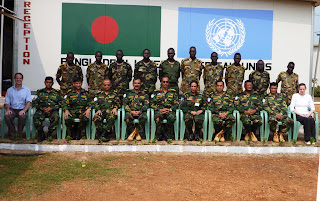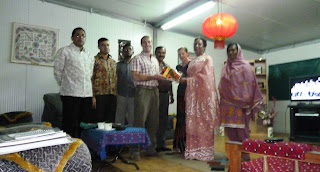
Completely unrelated to this blog, but us enjoying a drink after our tour of the only brewery in South Sudan (Corlia, Louis and their son)

Braving the boda bodas
With our time in Juba drawing to a close it is worth mentioning the medical students again, for they have earned a full blog to themselves.
We arrived with intentions to teach the junior doctors but were unfortunately bowled over by indifference and disinterest. After writing talks and lectures only to deliver them to an empty room (or the occasional nurse specialist) we were rapidly losing enthusiasm. This was, however, thankfully short lived as the first four medical students came strolling into our lives.
Some recent history:
Back in the depths of time, before the civil war, the medical school in Juba thrived. Teaching was done in the Government hospital (I believe it has retained its name from this time) and doctors emerged to serve the sick of Sudan. During the conflict the three medical schools based in the Southern part of Sudan: Juba University, Upper Nile University and Bahr el Gazal University medical schools, were relocated to Khartoum in the North, the capital of the country, for safety. The students were still a mix of people from both the Northern half and the Southern Half of the country but as time passed the lecturers of Southern origin vanished leaving University staff of almost entirely Northern origin. The University infrastructure, equipment and all other teaching tools were basically owned by the North. With the Comprehensive Peace Agreement (CPA) signed in 2005 to end the war work began to build a Southern Sudanese State and eventually an obvious part of this would be the relocation of the medical schools. When term ended in November 2010 the three Southern University Medical schools were officially shut in the north but since then there has been no sign of them opening in the south. It takes no mathematician to work out that this is now a whole year with no formal education. The fact that the medical schools have yet to open is not a huge surprise since there are few lecturers, few buildings and no teaching aids. There has been fighting in Upper Nile as recently as the last few weeks, and when we visited the hospital a couple of weeks back there was certainly no way it could accommodate students and despite its enthusiasm Bahr el Gazal still needs a lot of work to provide adequate pre and post clinical training. If the closure continues there will be serious repercussions for healthcare in this emerging country. I have yet to hear anyone sound concerned that there will be no new doctors graduating this year at all. That means no house officers at all. Nil. None. In a country already short of doctors this is a disaster. My biggest fear is the tragedy of a student trained for 5 years of his 6 year degree but unable to finish due to university closure and then starting his carreer somewhere else. Perhaps he (there is a good mix of men and women in medical school so I use the male sex merely for ease) will be pouring bottles of beer for the multitude of expatriates every evening lamenting how he almost graduated medical school as the disbelieving faces gaze through him, if not believing not really caring anyway. The problem for the medical school is that with medical students and doctors, in the ‘aid world’, you don’t get much bang for your buck. Midwives, they get cash, and this is good news especially in a country with the highest maternal mortality on the planet. But it is much much cheaper to train a midwife than a doctor. But a healthcare system cannot function without doctors.
I must add here that clearly it is not a bad thing to be pouring beers for a living, just that 5 years of medical school prepares you for something different.
But that is the rant over, though I hope it gives you a little more understanding as to what has been happening here behind the scenes. So what of us? I take you back to those four keen and resourceful souls who pitched up on ward 4 medical and asked Heidi and me if we would teach them. We said yes, and not because of us but because of them, something amazing emerged.
Those few joined rounds, talked to patients and presented them to me on the wards. Once a week we did formal classroom teaching on examination skills and every week all of them were there. And yes, by ‘all’ I mean 4, but this is four students who have chosen to turn up. They travel in from their homes on their own savings from part time jobs in the bars or laundry houses. If they were running late they would call and beg us to hold on for them. In the classroom after the lecture while we had them examining each other under our critical eye they took the criticism and advice and, most rewardingly, remembered it the next week. And all this when it did not count at all to their formal training. It got them no closer to a medical degree; no closer to becoming a doctor. But they came.
After a few months of this the numbers started to swell. We gradually increased our sessions from one day a week, to three and finally four, as we stopped all attempts at teaching the junior doctors to focus on this remarkable group of students.
By May our numbers had reached 10, by June 30 and by July 40. Our tiny office was chocablock. Having finished the examination skills we were now on to generic skills such as interpreting the chest X ray, Abdominal X ray and the Electrocardiogram and more specific topics such as triage, airway skills, diabetes and stroke. The list could go on but at the risk of boring you we’ll move on. However the new arrivals had heard about the examination skills sessions and asked for them to be repeated. We agreed and to ensure the small group nature of the sessions Heidi divided them up into groups of 14 and we ran evening classes. By this time we were working during the day at the military hospital (but that is another story) so the classes ran from 5pm until 8pm and again the turn out was extraordinary. And again, it counted (officially) for nothing.
The evening classes were awesome, sharing cokes and seven up that we picked up on the way over, eating ground nuts and prodding abdomens or listening to hearts (I even got my hands on some ophthalmoscopes for the eye exam and otoscopes for the ears but the less said about that the better). One evening our room was open because some decorators had been in to paint. The temptation for them had been too much and they had drunk the case of softies we had left in the cupboard. They denied it but their room full of empty cans gave it away. And who could blame them? Its bloody hot and they work from 6am til 7pm and sleep on the ground at the site to earn single figure dollars to send back to their families in Uganda. We picked up an extra crate for them the next time and asked if they would leave the ones in the room for the students: and they did!
Anyway, with our time coming to an end we could not help but worry that it would ultimately all be in vain. The university does not look like it will open soon and there was no one willing to take up the training. No one, that is, until Harvard Medical School with Massachusetts General Hospital stepped up. After stumbling across a group of preclinical students doing biochemistry on a step using a stick in the sand they had already started some physiology lecturing informally. They then flew out some trainers to run a full six week course covering all the basics that we had done plus more in hired classrooms and we topped the whole thing off with a written exam and practical exams (OSCEs) with Heidi and me involved in the examinations. The advertising brought in 170 students from outside of the city (Heidi and I alone were clearly not enough of a draw!). The whole event ended with a huge ceremony attended by the vice presidents wife and certificates were awarded for attendance and academic achievement. It was an amazing day filled speeches and photos but to see them actually walking away with a signed certificate endorsed by ‘Mass Gen’ was sweet as a nut. Sure, the university has not opened, and sure they are still no closer to becoming doctors, but this came as some reward for the hard work to this point that has not gone unrecognized. Their hunger to learn, their tenacity to improve things for themselves and not simply accept the hand they were dealt and resilience to the hardships that would break most others and to do all this without bitterness or resentment should be an inspiration to us all, especially those who like me have had education handed to them on a plate, in a world where surviving is, quite simply, easier.
This is a tribute to them, though not one will have this blog address, and an invitation to us to make the most of everything we have been given.

The OSCE exam

Some of our hardcore - Bol, Wani, Nyuiping and Chol

The ceremony


Mori receiving his certifcate with Michele one of our American colleagues on the edge.























